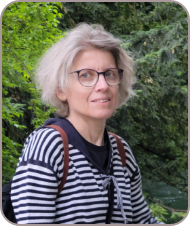
Psychotherapist
Licenses: New York, New Jersey
Languages: English, Russian
Education:
I have been a psychotherapist for more than 30 years. My education started in Moscow, where I received a master’s degree in psychology. After moving to the US in 1991, I continued my studies at Hunter College in New York, graduating with a Master in Social Work degree.
For the first ten years of my career as a therapist, I worked at the Jewish Board of Family and Children’s Services, one of the oldest mental health clinics in New York. The years spent at JBFCS taught me to work with psychological trauma and mental illness. I was part of a medical team helping patients adjust to consequences of neurological problems caused by disease or injury. Since 2006, I practice in New Jersey and joined TEMA in 2014. Over all these years, I have worked with patients from all walks of life, with diverse cultural, racial, and socio-economic backgrounds.
My personal experience of overcoming a serious medical condition gave me deep understanding of what it means to be sick. Whether it is Crohn’s disease, a stroke, or cancer, I support people and their relatives on their journey of fear, uncertainty, and despair. Severe medical problems not only damage our body but often take away our sense of self. A serious disease changes the course of our life and the lives of our family. I help my patients find a way back to themselves and learn to live again.
Over the past decade, I have been increasingly focusing on psychotherapy, support and psycho-education for people with acute or chronic medical conditions. With all its achievements, modern medicine rarely pays attention to potentially devastating psychological effects of sickness, and leaves people on their own to cope with fear and loneliness and to struggle with making critical choices. A presence of a knowledgeable and compassionate person can be invaluable and sometimes life-saving.
Sickness and age often arrive together. So, not surprisingly, my other specialization is working with the elderly. My therapy’s focus with people of advanced age is to listen to their life stories – tragic or funny, lighthearted or complicated, consequential or unresolved, stories of love and stories of loss. Most importantly, stories untold. Sometimes, therapy motivates my patients to start writing memoirs for their children and grandchildren. This part of my work is incredibly important because sharing their stories often helps people come to terms with painful memories that never stopped hurting, even after many years. William Faulkner famously said, “The past is never dead. It’s not even past”. Reconciliation with the past makes room in our minds and souls for new experiences, for writing new, and hopefully happy, life stories. At all ages, people can still repair old relationships and form new ones, fall in love and start dating, get excited about new things. There is always time…
440 West Street, Suite 323, Fort Lee, NJ, 07024
[email protected]
Phone: (347) 879 0202
Copyright © 2025 | All Rights Reserved | Created By Invisio Solutions Ltd